A Big No to “Congwanda”
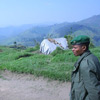
I loved the movie, but here is one for the very bad ideas file: Giles Foden, author of The Last King of Scotland, recently proposed creating a whole new country within Congo, or a “buffer state on the western shores of Lakes Kivu and Tanganyika” that “could be achieved by regional forces with Monuc-EU backup.” For someone like Foden, who has often railed against the negative effects of colonialism in Africa, this idea sounds a bit like colonial redux to me, and it does not belong in an op-ed in one of Britain’s premier newspapers. Creating a new state is ...
The Security Council talks MINURCAT
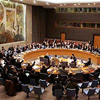
Last week, the U.N. Security Council discussed the details of the extended mandate for the year-old UN Mission in the Central African Republic and Chad, also known as MINURCAT. In September, Secretary-General Ban Ki-Moon suggested doubling the number of MINURCAT troops to address increased banditry threats, but many troop- contributing countries were wary of expanding a mission that has to date failed to fulfill its mandate to deal with the humanitarian threat posed by armed groups on Chad’s borders with Sudan’s troubled Darfur region and the northeastern part of the Central African Republic. At the MINURCAT discussion last week, the ...
Educate yourself—and your friends and family—about the crisis in Congo
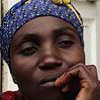
Congo’s conflict remains the world’s deadliest since World War II. Trying to understand what is going on in eastern Congo isn’t always easy, but some excellent resources have emerged as the crisis has dramatically worsened in the past several months: The Economist recently posted an impressive “videographic” on their website. It is an easily digestible, five-minute history lesson that “maps the war in Congo over the past fifteen years” (no small feat). Check out the International Crisis Group’s new multimedia presentation, “Congo Re-erupts,” which features a video interview as well as a conflict timeline, background and a “who’s who” of ...
One Sudanese “War Child” tells his story
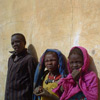
War Child is an award-winning documentary that explores the devastating impacts of 22 years of civil war in Sudan through the story of Emmanuel Jal, a former child soldier turned hip-hop musician and activist. As a child, Jal fought in the Sudan People’s Liberation Army, or SPLA, in the North-South civil war in Sudan resulted in the deaths of over two million people and the displacement of over 4 million others. Jal’s powerful personal story and his current attempts to help his country’s youth gain access to education and opportunity are glimmers of hope even as the conflict in Darfur ...
Warning Clouds Over Chad
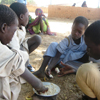
Freshly returned from a trip to the region, UN Under-Secretary-General for Humanitarian Affairs and Emergency Relief John Holmes painted a dire picture of the insecurity and banditry plaguing eastern Chad. While Holmes dutifully remained hopeful about the ability of the MINURCAT peacekeeping force to improve the situation, there have been a number of serious warning clouds of late: In July, Refugees International called MINURCAT’s presence in Chad and CAR “largely invisible.” In September, Oxfam blasted the UN’s performance in managing the policing component of MINURCAT. And perhaps most troublingly in October, Doctors Without Borders withdrew their expatriate staff from the ...
The UN In Congo: Peacekeepers or Bystanders?
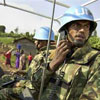
Last week, the New York Times, Human Rights Watch, and the Enough Project provided detailed accounts of the summary executions of an estimated 150 civilians by rebel leader Laurent Nkunda’s CNDP militia in the key town of Kiwanja in eastern Congo. While the rebels terrorized the population of Kiwanja in what HRW called “one of the worst killing sprees” in North Kivu province in the past two years, a contingent of over 100 U.N. peacekeepers was stationed less than a mile away. The New York Times called the Kiwanja massacre a “textbook example” of the continuing failure of MONUC (Mission ...
‘Concern’ About Refugee Camp Massacre: The Responsibility to Fret?
Early on Monday morning, some 60 vehicles filled with Sudanese forces, reportedly in search of smuggled weapons, surrounded the Kalma camp for internally displaced persons in South Darfur. When the camp residents tried to block the Sudanese forces from entering, government forces opened fire. Against a wall of gunfire, some civilians tried to defend themselves with ‘sticks, knives, and spears.’ Kalma is home to more than 90,000 people, making it one of the largest camps for internally displaced people in the world. The Sudanese military’s attack left some 64 people dead and more than 115 wounded. Victims ranged from 11 ...

